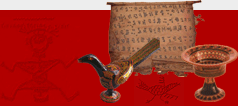|
彝族古代文论中的“押韵”
"Rhyme" in Traditional Yi Poetics
罗 曲 Luo Qu
西南民族大学彝学学院
【摘要】彝族古代文论是彝族古代文论家对彝族当时文学现象的总结,涉及当时文学创作中的各种文学体裁、作家应具备的修养、彝诗的格律等,提出了一系例具有彝族特色的文论概念。在论及彝族诗歌格律中的“音律”时,指出这种音律为“押音”。翻译整理者在注释中说原文为有音而无韵字,所谓押音就是押韵。本文认为这种观点是受汉语诗歌押韵的影响,不符合彝族诗歌音律的实际情况。从译文和注释看,彝族诗歌格律中的“音律”,就是押包括声母、韵母、声调在内的“音节”。
关键词: 彝族 古代文论 诗律 押韵
Abstract
“Yi ancient literary theories” is a summary concept referring
of the literary phenomena at the time they were developed,
touching on various kinds of literary styles which were
applied in literary creation, authors’ practices of self-cultivation
as well as rules and forms of Yi poetic composition. It
also puts forward a series of literary concepts with Yi
ethnic characteristic. When referring to metrics, the essay
indicates that such kind of metrics should be called “rhyming
syllable”. Translators explain that there is not rhyme but
syllable in the original text, what we named “rhyming syllable”
is just “rhyme”. The author believes that this kind of view
does not accord with actual contexts in Yi poetic metrics,
for it has been influenced by “rhyme” in Han Chinese concepts
of poem. From the view of translations and annotations,
the author draws a conclusion that “poetic metrics” in the
Yi literary tradition should be constituted by “rhyming
syllable” which includes initial consonant, vowel and tone.
Keywords: Yi people─ancient literary theories─poetic
metrics─rhyming syllable
作者简介:
罗曲,西南民族大学教授,历史文献学专业硕士点领衔导师。1955年7月出生于凉山州美姑县。1975年四川省邮电学校毕业后就职于凉山州邮电局,1978年考入西南民族学院(77级),82年毕业留校从事教学科研工作至今。2003年10月,曾出席由中国饮食文化基金会、四川大学主办、美国约翰霍普金斯大学、香港中文大学、四川烹饪高专等单位协办的第八届中国国际饮食文化研讨会并宣读论文《马湖彝族的砣砣肉与泡水酒》。发表有关民族民间文学、旅游文化、民俗文化方面的论文成果近百万字。获学校、省奖多项,国家级奖一项。
About the Author:
Luoqu, the head instructor on historical document of M.A
in Southwest University for Nationalities, was born in Meigu
county, Liangshan Yi autonomous prefecture in July 1955.
He took office in Liangshan post and telecommunications
office after he graduated from high school in 1975. He was
admitted by Southwest Nationlities Institute 1978. After
his graduation in 1982, he has been engaged in teaching
and doing scientific research in Southwest Institute (and
now University) for Nationalities. In October 2003, he attended
the 8th Chinese International Dietary Culture Seminar, which
was sponsored by Foundation of Chinese Dietary Culture and
Sichuan University, with the cooperation of the Chinese
University of Hong Kong, the American John Hopkins University,
Sichuan Culinary College as well as other organizations.
He read out the paper “Lump pork and natural wine of Meigu
Yi ethnic Minority” at the conference. Lots of his essays
and papers, adding up to nearly one million of words, have
been published, which were concerned with ethnic folk literature,
traveling culture and folklore. He has won many awards at
university and provincial level. One of his papers won a
national-level prize.
|





